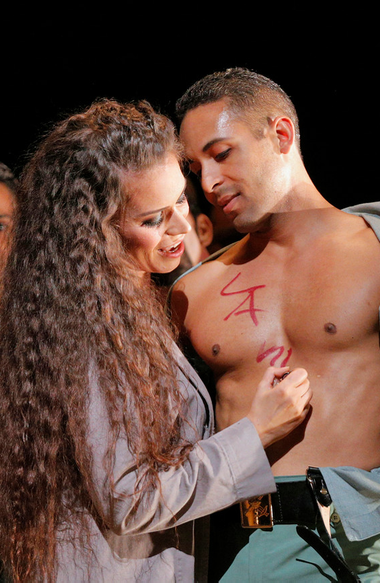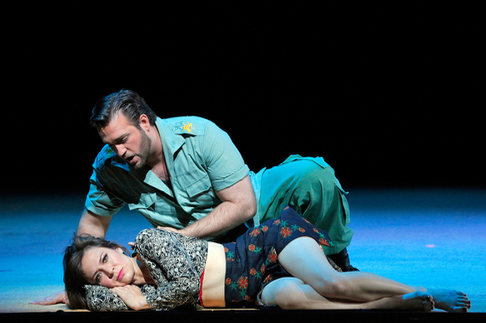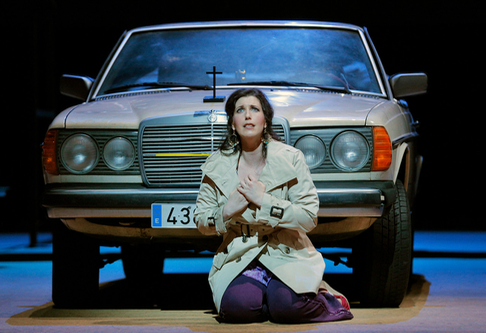
04 Jun 2016
Carmen in San Francisco
Calixto Bieito is always news, Carmen with a good cast is always news. So here is the news.
English Touring Opera are delighted to announce a season of lyric monodramas to tour nationally from October to December. The season features music for solo singer and piano by Argento, Britten, Tippett and Shostakovich with a bold and inventive approach to making opera during social distancing.
This tenth of ten Live from London concerts was in fact a recorded live performance from California. It was no less enjoyable for that, and it was also uplifting to learn that this wasn’t in fact the ‘last’ LfL event that we will be able to enjoy, courtesy of VOCES8 and their fellow vocal ensembles (more below …).
Ever since Wigmore Hall announced their superb series of autumn concerts, all streamed live and available free of charge, I’d been looking forward to this song recital by Ian Bostridge and Imogen Cooper.
The Sixteen continues its exploration of Henry Purcell’s Welcome Songs for Charles II. As with Robert King’s pioneering Purcell series begun over thirty years ago for Hyperion, Harry Christophers is recording two Welcome Songs per disc.
Although Stile Antico’s programme article for their Live from London recital introduced their selection from the many treasures of the English Renaissance in the context of the theological debates and upheavals of the Tudor and Elizabethan years, their performance was more evocative of private chamber music than of public liturgy.
In February this year, Albanian soprano Ermonela Jaho made a highly lauded debut recital at Wigmore Hall - a concert which both celebrated Opera Rara’s 50th anniversary and honoured the career of the Italian soprano Rosina Storchio (1872-1945), the star of verismo who created the title roles in Leoncavallo’s La bohème and Zazà, Mascagni’s Lodoletta and Puccini’s Madama Butterfly.
Evidently, face masks don’t stifle appreciative “Bravo!”s. And, reducing audience numbers doesn’t lower the volume of such acclamations. For, the audience at Wigmore Hall gave soprano Elizabeth Llewellyn and pianist Simon Lepper a greatly deserved warm reception and hearty response following this lunchtime recital of late-Romantic song.
Collapsology. Or, perhaps we should use the French word ‘Collapsologie’ because this is a transdisciplinary idea pretty much advocated by a series of French theorists - and apparently, mostly French theorists. It in essence focuses on the imminent collapse of modern society and all its layers - a series of escalating crises on a global scale: environmental, economic, geopolitical, governmental; the list is extensive.
For this week’s Live from London vocal recital we moved from the home of VOCES8, St Anne and St Agnes in the City of London, to Kings Place, where The Sixteen - who have been associate artists at the venue for some time - presented a programme of music and words bound together by the theme of ‘reflection’.
'Such is your divine Disposation that both you excellently understand, and royally entertaine the Exercise of Musicke.’
Amongst an avalanche of new Mahler recordings appearing at the moment (Das Lied von der Erde seems to be the most favoured, with three) this 1991 Mahler Second from the 2nd Kassel MahlerFest is one of the more interesting releases.
‘And there was war in heaven: Michael and his angels fought against the dragon; and the dragon fought and his angels, And prevailed not; neither was their place found any more in heaven … that old serpent … Satan, which deceiveth the whole world: he was cast out into the earth, and his angels were cast out with him.’
If there is one myth, it seems believed by some people today, that probably needs shattering it is that post-war recordings or performances of Wagner operas were always of exceptional quality. This 1949 Hamburg Tristan und Isolde is one of those recordings - though quite who is to blame for its many problems takes quite some unearthing.
There was never any doubt that the fifth of the twelve Met Stars Live in Concert broadcasts was going to be a palpably intense and vivid event, as well as a musically stunning and theatrically enervating experience.
‘Love’ was the theme for this Live from London performance by Apollo5. Given the complexity and diversity of that human emotion, and Apollo5’s reputation for versatility and diverse repertoire, ranging from Renaissance choral music to jazz, from contemporary classical works to popular song, it was no surprise that their programme spanned 500 years and several musical styles.
The Academy of St Martin in the Fields have titled their autumn series of eight concerts - which are taking place at 5pm and 7.30pm on two Saturdays each month at their home venue in Trafalgar Square, and being filmed for streaming the following Thursday - ‘re:connect’.
The London Symphony Orchestra opened their Autumn 2020 season with a homage to Oliver Knussen, who died at the age of 66 in July 2018. The programme traced a national musical lineage through the twentieth century, from Britten to Knussen, on to Mark-Anthony Turnage, and entwining the LSO and Rattle too.
With the Live from London digital vocal festival entering the second half of the series, the festival’s host, VOCES8, returned to their home at St Annes and St Agnes in the City of London to present a sequence of ‘Choral Dances’ - vocal music inspired by dance, embracing diverse genres from the Renaissance madrigal to swing jazz.
Just a few unison string wriggles from the opening of Mozart’s overture to Le nozze di Figaro are enough to make any opera-lover perch on the edge of their seat, in excited anticipation of the drama in music to come, so there could be no other curtain-raiser for this Gala Concert at the Royal Opera House, the latest instalment from ‘their House’ to ‘our houses’.
"Before the ending of the day, creator of all things, we pray that, with your accustomed mercy, you may watch over us."

Calixto Bieito is always news, Carmen with a good cast is always news. So here is the news.
The Calixto Bieito Carmen is old news, this edition having already taken place in Barcelona, Venice, Torino and Bilbao where I saw it in 2014. Already a Bieito Carmen has been around on advanced European operatic stages since 1999. This production was never headline news, finding instead this extraordinary stage director in a rather subdued state.
Bieito always creates a world that puts you on edge, here it was the cut-out bulls on the hilltops of Spain, gypsies in dilapidated cars, freaked out youth, blinding beaches and lurid tourism, and of course bull rings. Yes, in Bieito’s world there is fellatio, pissing, nudity, gang rape, child abuse and unbridled brutality. Yes, Mercedes was Lilas Pastia’s middle-aged wife, and yes, Don Jose was really annoyed by an insistent Micaëla who sang her pretty song and then gave Carmen the “up-yours.”
First delineated by a semi-naked soldier hypnotically circling the stage for much of Act I Bieito’s Act IV bull ring finally was only a chalk-line circle laid down by Lilas Pastia in which the raw power of Carmen’s indifference was pitted against the impotent supplications of Jose. Murdered, Jose dragged Carmen out of the circle — like a dead bull.
Movement is violent and often sudden in this Bieito world. There were very limited moments of dialogue but many additions of crowd noise and shouts, and punctuations of imposed silence broken by frenetic crowd clamor. The quintet [in Bilbao] was splendidly staged catching the lightening speed of the music in fast, demonstrative movement, and the trio was deadpan, the cards read on the hood of a car with no sense of doom, Carmen indifferent to her fate.
There was no set. A simple cyclorama against which there was first a flag pole and a phone booth, then a car and a Christmas tree, then eight cars and a gigantic cut out bull and finally nothing except a beach with a marked out chalk ring.
All this might seem a recipe for a powerful tragedy, but this does not seem to be Bieito’s intention. The telling of Jose’s infatuation disappears into this cosmos of marginal life in Spain and becomes unimportant in itself, its emotions melted into the morass of a much bigger and equally violent, emotionally raw world.
Bieito’s Carmen world did not make it to San Francisco.
Production notes clarify that what we have now in San Francisco is “based on” Bieito’s 1999 production, staged “after Bieito” by Spanish director Joan Anton Rechi. For the record there was no fellatio, no pissing, no gang rape, no child abuse and no unfettered brutality. Replacing Bieito’s violent, elemental world are precious emblems of some Spanish village in North Africa, to wit 1980’s Mercedes Benz (six of ‘em) that are used as taxi’s thereabouts.
Replacing Bieito’s mythical characters, his larger than life personages that embody the tragic human scope of men and women (and a child as well) caught relishing this brilliant, brutal world were very fine singers in young artist programs or recent graduates thereof (with the exception of the Micaëlas of Ellie Dehn and Erika Grimaldi, both established, elegant exponents of Mozart’s Countess).
 Irene Roberts as Carmen, Brian Jagde as Don José
Irene Roberts as Carmen, Brian Jagde as Don José
Bieito’s emblematic tragedians were now young, real people, who recently perfected their roles in coaching studios. Director Joan Anton Rechi obliged their fine preparation with what would liked to have passed as a type of realism. The resulting movement on stage however read as practiced mechanical motion rather than as a gritty enactment of character realization. With no real character achieved by these too willing young artists no continuity of story emerged, leaving Bizet's tragic masterpiece a series of unrelated musical numbers.
Italian conductor Carlo Montanaro relished the elegance of the esteemed San Francisco Opera Orchestra, finding a continuum of refined sound rather than capturing the changing moods and violence Bizet’s musical kaleidoscope. Tempos seemed too fast or too slow, or both at the same time. Both the flute and cello solos were self-consciously over-articulated destroying dramatic mood in search of elegance.
The San Francisco Opera Orchestra is a major ensemble, capable of plumbing the dramatic depths of the repertory, in fact you get the feeling it is straining at the bit to do so. Pairing it with an eviscerated production and a clueless conductor squanders this splendid resource.
Both of the Carmens, Irene Roberts and Ginger Costa-Jackson who alternate in the eleven performances are viable artists and both are real, ingenue Carmens. I particularly appreciated the variation of vocal color projected by Mlle. Costa-Jackson, and greatly admired the splendid voices and solid techniques of both artists. Tenor Brian Jagde sings ten of the eleven performances, many back to back, i.e. day after day. Tenor Adam Diegel sang one performance (May 28) in which he found some of Bizet’s hapless lover. Brian Jagde seemed too busy making great big tenor sounds — that wore us out over the long evening — rather than finding the humanity of this role.
 Ellie Dehn as Micaëla
Ellie Dehn as Micaëla
Italian soprano Erika Grimaldi was miscast as Micaëla, though her “Je dis” on May 28 was beautifully and very elegantly delivered. On June 1 soprano Ellie Dehn was a-fish-out-of-water and in apparent vocal difficulty. Neither of the two Escamillos could fill the breeches of Bizet’s toreador, nor muster the required vocal coglioni — inexplicable casting. All supporting roles were responsibly sung, though cast without regard to the character needs of this Bieito production.
Michael Milenski
Casts and production information:
Carmen: Ginger Costa-Jackson (May 28); Carmen: Irene Roberts (June 1); Don José: Adam Diegel (May 28); Don José: Brian Jagde (June 1); Micaëla: Ellie Dehn; Escamillo: Michael Samuel (May 28); Escamillo: Zachary Nelson (June 1); Frasquita: Amina Edris; Mercédes: Renée Rapier; Morales: Edward Nelson; Zuniga: Brad Walker; El Dancairo: Daniel Cilli; El Remendado: Alex Boyer; Lillas Pastia: Yusef Lambert. Chorus and Orchestra of San Francisco Opera. Conductor: Carlo Montanaro; Production: Calixto Bieito; Stage Director: Joan Anton Rechi; Set Designer: Alfons Flores; Costume Designer: Mercé Paloma; Lighting Designer: Gary Marder. War Memorial Opera House, San Francisco, May 28 and June 1, 2016.